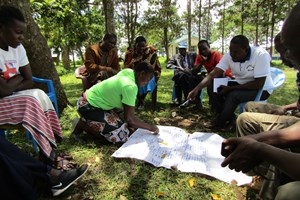Sweet Potato
Countries / Regions
Uganda
Partners
BGS
Funders
GCRF
Timescale
Project Team
Prof Ros Cornforth, Mr Dai Clegg, Dr Hannah Young, Miss Luisa Ciampi, Prof Ted Shepherd, Dr Lindsay Todman, Prof Carol Wagstaff, Dr John Seaman, Dr Javier Miret
Background
Around 224 million people in sub Saharan Africa- nearly 24% of the population- are under-nourished (FAO 2017). Sweet Potato is a mainstay of household food security and a major source of Vitamin A across the region, outranking cassava and maize in importance in 7 countries of East and Central Africa. Any changes in the availability of SwP will therefore have a significant impact on peoples’ health, economic development and living standards. Uganda is the leading producer of sweet potato in Africa and is the focus of the Walker Institute’s on-going research and policy work (see FCFA HyCRISTAL, IDAPS, NIMFRU). This project will complement collaborators current farmer-focused initiative by exploring potential impact of climate change in the medium to long term on sweet potato production systems in Uganda and the implications for food security, health and nutrition and the wider economy.

Our Research
Although global aspects of climate change are well-understood, there remains great uncertainty at regional and national scales, and traditional probabilistic approaches lead to a ‘cascade of uncertainty’ (Wilby and Dessai, 2010). Physically grounded narrative approaches (using Causal Inference – CI) offer a way of managing this uncertainty. We will develop a CI analytical framework to combine data from physical, natural and social sciences and deliver policymakers a visualisation tool based on the IDAPS platform, providing quantitative insight into the potential impact of climate change scenarios on SwP production and household food security in different livelihood zones of Uganda under different scenarios. We will develop CI networks for SwP under different climate conditions, incorporating the specific crop vulnerabilities of waterlogging and pest exposure, working with colleagues in hydrometeorology and entomology.
The Integrated Platform and Database for Policymakers (IDAPS, an open-source platform for government and community stakeholders) co-developed by the Walker Institute and Evidence for Development (EfD) as part of the FCFA/HyCristal project will give local users access to output visualisations, allowing them to create their own livelihood-impact scenarios. This quantitative insight is particularly important because crop models of SwP production are more uncertain than models of other major crops. However, within the CI framework, results from these models can be combined with additional sources of understanding including insights systematically collected from experts in SwP production, to account for the confounding influences and sampling biases present in any set of observations (Pearl, 2009). This offers a natural framework for connecting weather and climate to specific impacts and risk, mediated by human behaviour (policy, institutions, political economy, legal frameworks), to provide policymakers with evidence-based interventions to promote food security and resilience, strengthening the potential for policy adoption that reduces global hunger (SDG2).
Our Research
Although global aspects of climate change are well-understood, there remains great uncertainty at regional and national scales, and traditional probabilistic approaches lead to a ‘cascade of uncertainty’ (Wilby and Dessai, 2010). Physically grounded narrative approaches (using Causal Inference – CI) offer a way of managing this uncertainty. We will develop a CI analytical framework to combine data from physical, natural and social sciences and deliver policymakers a visualisation tool based on the IDAPS platform, providing quantitative insight into the potential impact of climate change scenarios on SwP production and household food security in different livelihood zones of Uganda under different scenarios. We will develop CI networks for SwP under different climate conditions, incorporating the specific crop vulnerabilities of waterlogging and pest exposure, working with colleagues in hydrometeorology and entomology.
The Integrated Platform and Database for Policymakers (IDAPS, an open-source platform for government and community stakeholders) co-developed by the Walker Institute and Evidence for Development (EfD) as part of the FCFA/HyCristal project will give local users access to output visualisations, allowing them to create their own livelihood-impact scenarios. This quantitative insight is particularly important because crop models of SwP production are more uncertain than models of other major crops. However, within the CI framework, results from these models can be combined with additional sources of understanding including insights systematically collected from experts in SwP production, to account for the confounding influences and sampling biases present in any set of observations (Pearl, 2009). This offers a natural framework for connecting weather and climate to specific impacts and risk, mediated by human behaviour (policy, institutions, political economy, legal frameworks), to provide policymakers with evidence-based interventions to promote food security and resilience, strengthening the potential for policy adoption that reduces global hunger (SDG2).
Our Impact
This research fills a critical gap for under-researched food crops, through developing protocols needed to allow the impact on crop yields of key vulnerabilities (waterlogging and pest infestation in the case of SwP) to be better quantified and integrated in CI networks and food security analysis This work will demonstrate the use of climate narratives to show quantitatively how drivers of food insecurity affects food access. The study, which focuses on a single crop at subnational level, can be scaled up to national and regional levels, and down to local household level. It can also be extended to multiple crops and to different policy areas Long term expected outcomes:
- Improved budgetary planning for sustainable climate resilient agriculture
- Welfare-reduced burden of disease through reduction in Vitamin A deficiency
- Exporting expertise and centre of excellence through the application of CI networks in policy planning;
- Targeted flood resilient infrastructure investment with year round market access for poorer communities
- Economic damage of climate related shocks minimised by greater local food security and reduced reliance on food imports.


